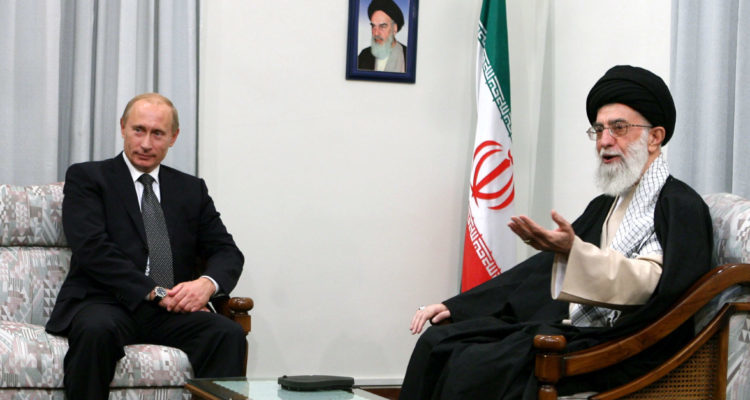The Biden administration could find itself accused of having the blood of innocent Ukrainian civilians on its hands.
By Con Coughlin, Gatestone Institute
Iran’s efforts to conclude a revised nuclear deal with the Biden administration could result in the Kremlin receiving a windfall of half-a-billion dollars to fund its war effort against Ukraine.
That is the conclusion reached by Western security officials who are becoming increasingly concerned by the discussions taking place between Moscow and Tehran about deepening their cooperation once the nuclear deal has been signed.
Iran has already engaged in detailed discussions with Moscow about helping Russia to evade Western sanctions by giving it access to Tehran’s sophisticated financial sanctions-busting network.
With the Russian economy suffering as a result of the economic sanctions imposed in retaliation for President Vladimir Putin’s unprovoked invasion of Ukraine, Moscow is increasing the pressure on Tehran to provide it with economic support.
In particular, the Kremlin is pressing Tehran to pay a number of outstanding debts relating to its nuclear program.
Russia has worked closely with Iran on the construction of the controversial Bushehr nuclear plant, with construction work finally being completed in 2011.
With Russia now facing the prospect of long-term economic sanctions, as most Western countries look to end their dependence on Russian oil and gas, Western security officials say Moscow is keen that Tehran repay its outstanding debts relating to previous work on the Bushehr facility.
Moscow is also in the process of negotiating a number of trade agreements with Tehran, including arms deals, in the expectation that it can establish lucrative trade ties with Iran once the nuclear deal has been signed.
Putin served notice to Washington last year that Moscow intends to proceed with its controversial arms sales to Iran as well as complete the construction of a nuclear power plant.
“For economic reasons, Russia is interested in (military) cooperation,” Putin said. “And the political reasons are that we believe that Iran must be an independent state capable of defending its national interests.”
‘Iran has promised’
To boost its economy, Russia is now demanding that Iran pay in cash for the deals currently under discussion, as well as repaying outstanding debts believed to be worth more than half-a-billion dollars in cash owed for Russia’s work on the Bushehr facility.
Following detailed discussions between senior Iranian and Russian officials in recent weeks, Western security officials say that the two sides have come to an arrangement where Iran has promised to repay its outstanding debt relating to Bushehr once the new nuclear deal is signed and the Biden administration agrees to lift sanctions against Iran.
“Iran has promised Russia that it will pay its debt once Iranian funds held in the U.S. are no longer under sanctions and become available for use,” a senior Western security official told me this week. “Furthermore, Iran has made transferring down payments to Russia to implement the military agreements between the parties conditional on reaching an agreement in Vienna.”
Attempts to deepen trade ties between Moscow and Tehran have seen a number of top-level Iranian delegations visiting Russia in recent weeks, including Petroleum Minister Javad Owji, and Deputy Governor of the Central Bank of Iran, Mohsen Karimi.
Iran claims that more than half a billion dollars are currently being held in the U.S. as part of sanctions imposed by the Trump administration. The funds would be released once a nuclear deal is agreed, enabling Iran to transfer the money to Moscow to repay its outstanding debt.
Deeply embarrassing for Biden administration
Apart from offering to help the Kremlin evade sanctions, Iran is also believed to be working to engage China and enlist its assistance as well for the purpose of bypassing Western sanctions.
Iran is already operating a clandestine banking system and carrying out international trade under sanctions by using shell companies and cover accounts in banks in China, Turkey, Singapore, and Hong Kong.
Despite denials by the Iranian Foreign Ministry, Russian Foreign Minister Sergei Lavrov was quoted by the Russian news agency RIA confirming that there has been coordination between the parties to bypass Western sanctions.
Western security officials are concerned that any funds Iran sends to Moscow will be used to help fund Putin’s war effort in Ukraine. There have already been reports of Iran providing weapons to support Russia’s war effort in Ukraine, and Moscow is desperate to find new ways of supporting its economy so that it can maintain its military offensive.
The Russian economy has been badly hit by Western sanctions imposed following the Ukraine invasion, one recent example being the announcement that state-owned Russian Railways has been ruled in default on a bond after missing an interest payment last month.
The fact that Iran is actively seeking to provide Moscow with financial assistance which could be used to fund the war in Ukraine is deeply embarrassing for the Biden administration, which still shows no sign of ending its efforts to revive the nuclear deal.
Certainly, if the deal does go ahead, enabling Iran to pay off its debts to Moscow, then the Biden administration could find itself accused of having the blood of innocent Ukrainian civilians on its hands for allowing Iran to fund the Kremlin’s war effort.





